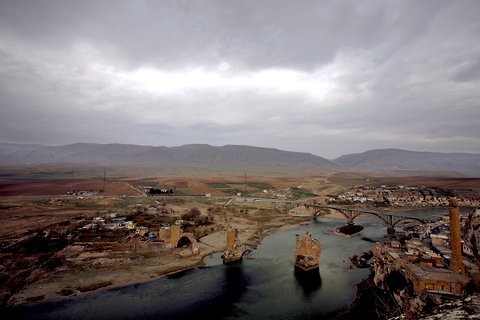Would Öcalan’s release bring peace to Turkey?
In recent months the Kurdistan Workers’ Party (PKK) highlighted the following argument: If PKK leader Abdullah Öcalan’s prison conditions are eased, then the PKK would withdraw its units from Turkey and Öcalan would eventually convince the PKK militants to lay down arms as a quid pro quo for being released on house arrest.
Just recently, Aysel Tuğluk brought this argument into the public sphere once again, and many liberal intellectuals really think that it is possible to bring peace in exchange for Öcalan’s release on house arrest.
Just like any other debate, unfortunately, Turkish intellectuals have not paid attention to the details of the issue. Rather, they focus on what the political actors are saying and establish their thoughts on political actors’ statements. However, it is a proven fact that politics in the Middle East is larger than politicians and political actors. In many cases, political actors, who are expected to lead politics, cannot implement their policies on their own; however, they may very well become the object of the politics that they are in. This is especially true if you are dealing with an armed organization and if violence is part of its long-lasting policy.
Those who think that Öcalan would stop the violence base their argument on Öcalan’s influential position on the Kurdish community. Yes, indeed Öcalan is an influential figure and pro-PKK Kurds in particular treat him as a prophet of their vision and policies and even their own existence. Thus, it would not be presumptuous to assume that Öcalan could stop the violence if he exerted his influence on his followers.
Well, there are a number of problems in this argument. First, Öcalan highlights his release from the İmralı Island prison as a precondition for peace negotiations and a withdrawal of the PKK units from Turkey. Therefore, even Öcalan himself does not guarantee peace after his release from prison. He guarantees that he will convince PKK leaders to withdraw the PKK units from the country.
There are two problems in this argument itself. First, Öcalan is not a trustworthy negotiation partner. The state has been negotiating with him since 2006 to bring peace; however, while negotiating with the state, Öcalan has ordered the PKK to re-establish its network as the Kurdistan Communities Union (KCK) to bring the armed wings into urban centers. Therefore, there is no trustworthy leader to begin negotiations with. Second, there are many factions within the PKK that would not listen to Öcalan even if he did order the PKK to withdraw its units. There is evidence that the opposite is true. When Öcalan ordered the PKK to withdraw from Turkey in 1999, some units in Tunceli province did not listen and did not return to northern Iraq.
In addition, despite the fact that Öcalan just recently stated that he has reached an agreement with the state and that the PKK does not need to resume the fight, within a week of the statement the PKK resumed and intensified the fight, which proved that Öcalan cannot fully control the PKK, either.
Also, the political climate in the Middle East is unpredictable. Therefore it would be a mistake to assume that the political status quo will continue to serve the interests of both parties, PKK-Öcalan and Turkey, after Öcalan’s release on house arrest, to bring peace. There are too many unknowns in this region that could drastically change the political situation, affecting both the PKK and Turkey and interrupting peace negotiations.
The very existence of the PKK is an outcome of the changing political climate in the region, influencing the PKK’s ability to adapt to such change. In the last 30 years, the region that the PKK operates in has faced the end of the Cold War, and the PKK adapted itself to the new situation by denouncing its communist background and emerging as a nationalist party. After the first Gulf War, the PKK gained military advantages by confiscating Saddam’s weapon caches.
When the US invaded Iraq, the PKK established the Party for a Free Life in Kurdistan (PJAK), its Iranian units, with the hope of helping the US destabilize Iran. Three days before Russia’s attack on Georgia, the PKK sabotaged the Baku-Tbilisi-Ceyhan pipeline to let Russia know they could become partners. All in all, there is much evidence that the very existence of the PKK depends on the changing political circumstances of the region. Therefore, assuming that the circumstances will not change after Öcalan’s release on house arrest and that he would want to bring the PKK militants down from the mountains is childish.
Even if he wants to, there are many unknowns that could change the political equations overnight and turn everything upside down. Therefore, if Öcalan is sincere about him being the man of peace, he should first show his ability and willingness to bring peace by ordering that the PKK units withdraw from the country. Then negotiations about the PKK’s laying down arms can resume.
via Would Öcalan’s release bring peace to Turkey?.
Emre Uslu
Todays Zaman
